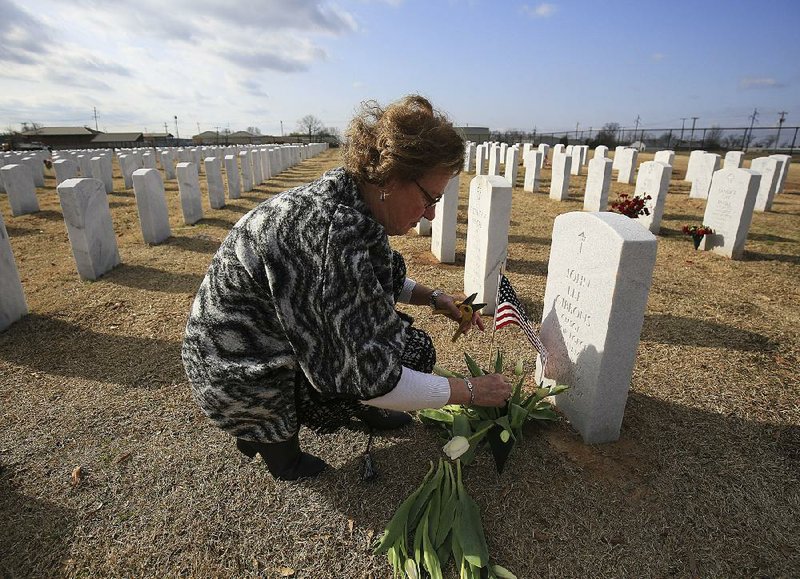For almost three years, ever since her husband, John, died from cancer associated with Agent Orange exposure in Vietnam, Elly Gibbons of Fort Smith has written, phoned and emailed congressional members in Arkansas and nationwide.
Her message: Strike down the federal law that withholds full survivors benefits from more than 65,000 military widows and widowers.
Edith Smith of Springfield, Va., has visited congressional offices on the same mission for more than 20 years. Last week, she spoke again at a Washington news conference.
"Now is the time for policymakers to honor the sacrifice of death" by her husband and others who lost their lives in connection with their military service, she said. Smith urged that lawmakers restore full survivor benefits.
This Memorial Day weekend, Congress is closer than it has been in decades to repealing a provision popularly known as the "Widow's Tax."
Not a tax at all, it's actually a federal law, 10 U.S. Code 1451 (c)(2), that bars military survivors from collecting most of the paid-for annuities they and their spouses counted on.
Titled the "DIC Offset," the current law forbids spouses from collecting Survivor Benefit Plan insurance that their military partners paid into if they also qualify for a Veterans Affairs benefit called Dependency and Indemnity Compensation. The VA benefit is paid in cases in which military members died on duty or of service-related causes later.
The DIC Offset, or Widow's Tax, reduces survivors' incomes on average by almost $8,000 per year, according to federal estimates.
The U.S. Senate's 100 members have mustered 73 sponsors and co-sponsors for S. 622, the Military Widow's Tax Elimination Act, according to the congressional website congress.gov.
The U.S. House has 319 sponsors and co-sponsors -- of its 435 members -- for a similar bill, H.R. 553, the Military Surviving Spouses Equity Act.
Those numbers improve the chances that the bills will come to votes in both chambers, after comparable bills died quietly in committees year after year.
"I'm very pleased to announce that we now in the House of Representatives have exceeded 290 co-sponsors, which has allowed us to move the bill to the floor for the first consideration after 25 legislative days. The Senate has also reached its threshold to do the same for Senate Bill 622," said U.S. Rep. Joe Wilson, R-S.C., at a Capitol Hill news conference last week. Wilson is sponsor of the House bill.
Gibbons has already helped sign on as co-sponsors all six of Arkansas' congressional members.
Now she's pushing them, along with other House and Senate members, to identify federal funding to pay for the changes outlined in the bills, estimated at $5 billion.
In a recent call to a staff member for Sen. Tom Cotton, R-Ark., Gibbons congratulated Cotton on sponsoring the Senate bill and on his new book about his military service, titled Sacred Duty: A Soldier's Tour at Arlington National Cemetery.
"Of all the people in the Senate and in Congress, that man needs to find the funding for 65,000 widows," Gibbons recalls telling the staff member. "He looked them in the eye and handed them the flag [at Arlington]. This man needs to find the funding."
Another speaker at last week's news conference about restoring military survivors' benefits, U.S. Rep. John Yarmuth, D-Ky., told the Arkansas Democrat-Gazette afterward that success has "always been a question of the money."
"And it's still a question," he said.
But the result may be different this time, Yarmuth said.
"Oh, it'll get through the House. Yeah. And I'm very optimistic about the Senate," he said. "There are a lot of people, a lot of reasons for Republicans and Democrats to vote for it."
During the news conference, South Carolina's Wilson called activists like Smith "tireless advocates" who have "sent a message to Congress" that it owes a debt to the men and women who served.
"It is not a gratuitous benefit. They have earned it," Wilson said.
A Section on 05/27/2019
